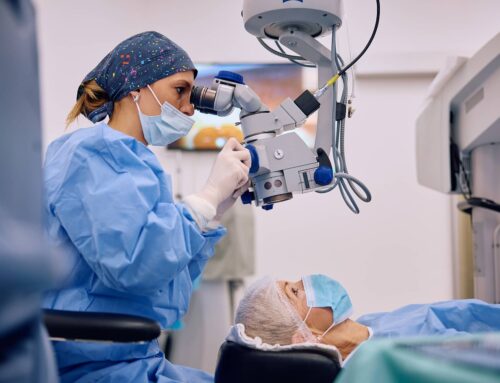The prospect of cataract surgery can be daunting at first, but having an idea of how the process works can help ease the anxiety that accompanies it. Today, we’ll be taking you through the entire journey – what to expect before, during, and after cataract surgery – in order to impart a deeper understanding of each step so that you can look forward to having your vision improved.
What To Expect Before Cataract Surgery?
Pre-operative Consultation
Before undergoing cataract surgery, you’ll have a pre-operative consultation with your ophthalmologist, anywhere between 3-weeks to 6-months prior. During this appointment, your eye doctor will go over what to expect before, during and after cataract surgery, as well as, thoroughly examine your eyes, review your medical history, discuss your vision goals, and determine the best type of intraocular lens (IOL) for your needs. They’ll also explain the risks and benefits of the procedure and answer any questions you may have.
Preparing for Surgery Day
As your surgery date approaches, you’ll be given specific instructions on how best to prepare. For instance:
- You may need to stop certain medications temporarily.
- Arrange for someone to drive you home afterwards.
- Don’t wear any jewelry, makeup, lotions, or cologne.
- Wear comfortable, loose clothing (pants, skirts, button-up tops). Wear low-heeled, non-slip shoes.
- You’ll be prescribed eye drops to use before and after the surgery. Fill these at least 4-days prior to surgery and take as directed leading up to your appointment.
What To Expect On Cataract Surgery Day
The Surgical Procedure
Cataract surgery is typically an outpatient procedure, meaning you’ll be able to go home the same day. The most common type of cataract surgery is phacoemulsification, which involves:
- Prep: Topical anesthesia (eye drops) or local anesthesia around the eye is given.
- Incision: A small incision is made in the cornea.
- Cataract Breakdown: Ultrasound waves are used to break up the clouded lens. The fragments are then removed with gentle suction.
- IOL Insertion: An artificial intraocular lens (IOL) is placed into the same place as the natural lens.
Note: Some patients may require additional sedation or general anesthesia, depending on their medical history and level of anxiety.
What to Expect During Cataract Surgery
- The surgery itself usually takes 20-30 minutes, but you should plan to be at the facility for 1-2 hours to allow for preparation and recovery time.
- If you’re able, you’ll walk into and out of the operating room. You’ll sit in a recliner chair, and a nurse will administer numbing eye drops.
- A sterile drape with a hole for your eye will cover you, and you may see unusual shapes, bright lights, brilliant colors, or movement.
- Your eye is kept open with a small spring, which is not uncomfortable and you won’t experience any pain during the procedure.
What To Expect After Cataract Surgery
Going Home
After the surgery, you’ll spend some time in the recovery area, where your vision and eye pressure will be monitored. If you received IV sedation, refrain from making important decisions, signing documents, driving vehicles/machines, or participate in activities like swimming, climbing ladders, or riding a bike until it wears off, which takes about 24-hours.
How Recovery & Healing Works
Most patients experience minimal discomfort, but you may have some temporary side effects, such as:
- Some discomfort or a slight headache for 1-2 days after surgery (take acetaminophen).
- Slight scratchy or gritty sensations in the eye – it will pass.
- Mild eye irritation in the form of red/swollen eyelids.
- You may have blurred vision.
- Your eyes may be sensitive to light from between a few weeks to a few months.
It can take 4-6 weeks for the eye to fully heal and for you to reach your best vision.
Post-operative Care Instructions – Do’s and Don’ts.
- Don’t place any pressure on the eye for up to 6-weeks.
- Wear an eye shield or sunglasses to protect your vision as it heals.
- Don’t forcefully strain during bathroom breaks & increase fluid & fiber intake.
- Avoid strenuous activities or heavy lifting for at least 4-weeks.
- Avoid saunas/hot tubs for 1-week.
- Avoid swimming/submerging your head in water for at least 3-weeks.
- Avoid sleeping on the operated side for 2-weeks.
- You may watch TV, go for walks, and resume sexual activity.
Meds After Surgery
You can resume your regular medications with permission of your doctor, and you’ll be prescribed eye drops to prevent infection, control inflammation, and aid in the healing process. Always follow your doctor’s instructions carefully and attend all follow-up appointments to ensure proper healing and optimal visual outcomes.
By fully understanding what to expect before, during and after cataract surgery, you can help ensure a smooth recovery and successful procedure experience. If you’re considering cataract surgery, visit https://bestcataractsurgeons.com/ to find top-rated ophthalmologists in your area and schedule a consultation today.










